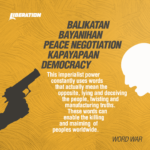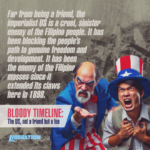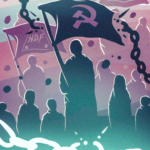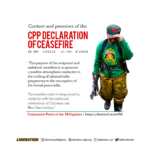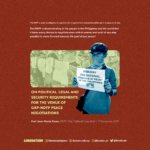Imperialism means war, imperialism means terrorism
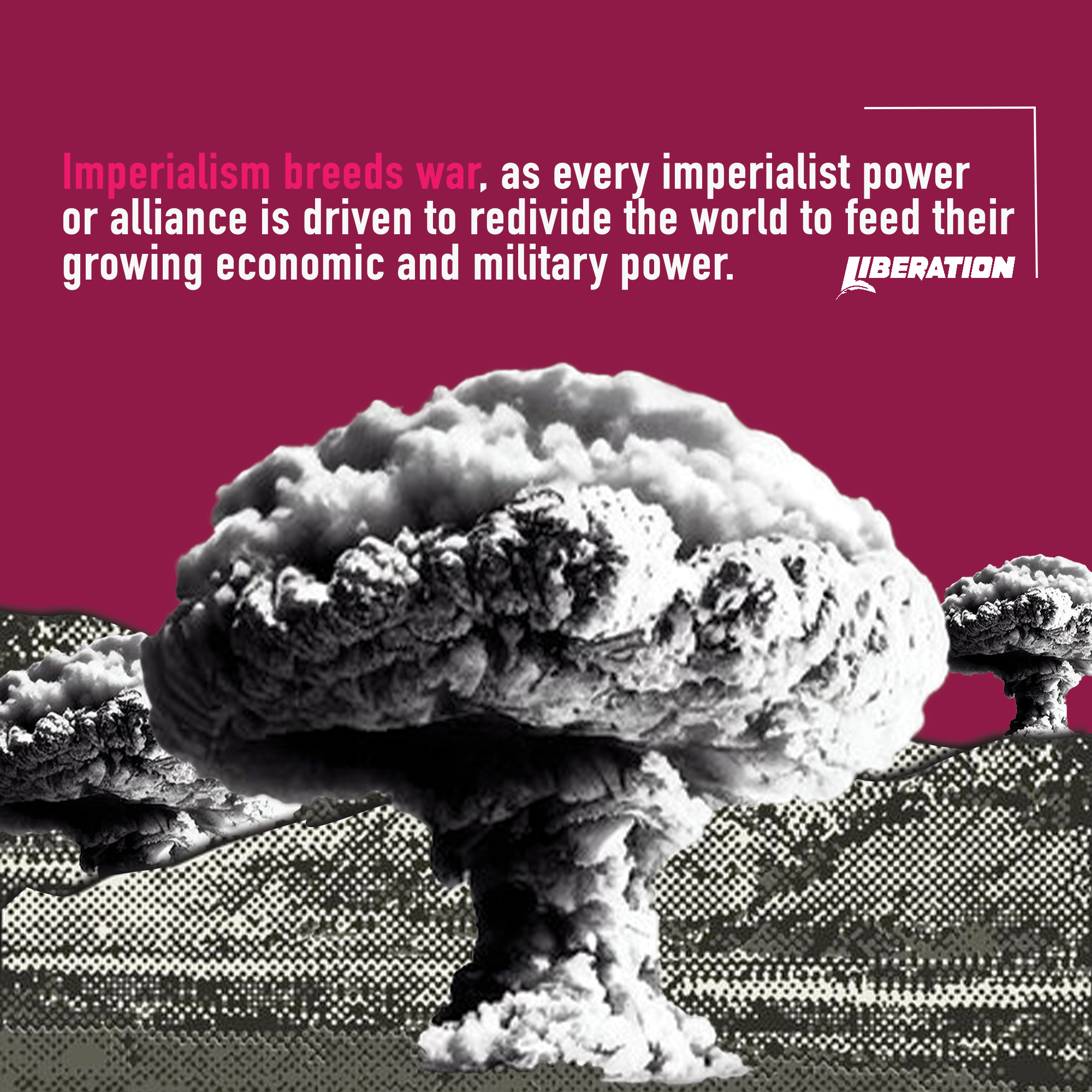
Before they underwent massive PR makeovers in Hollywood movies, the vampires are some of the best graphic tools used to explain the secret of capitalist accumulation. In Das Kapital, Karl Marx describes capital as “dead labor, that, vampire-like, only lives sucking living labor, and lives the more, the more labor it sucks.”
In other words, capitalists gain and expand their capital by sucking their laborers’ values, just as the mythical vampires drain their victims’ blood and lifesource for them to survive and become stronger. But while capitalism lives and grows stronger by sucking the blood of its victims, in doing so it encounters existential crises as its bloodsucking ultimately leads to scantier volume of blood to suck.
In Karl Marx’s summary: capitalism digs its own grave.
Today, as capitalism has globally spread its dominance, what monstrous vampire has capitalism become? Capitalism has reached its highest historical stage of development, described as monopoly capitalism or capitalist imperialism, since the early 20th century.
At the time, Russian proletarian leader Vladimir Lenin said in the preface of the German and French edition of his popular outline, Imperialism the Highest Stage of Capitalism:
“Capitalism has grown into a world system of colonial oppression and of the financial strangulation of the overwhelming majority of the people of the world by a handful of ‘advanced’countries.”
At the time, the “three powerful world marauders armed to the teeth”—America, Great Britain, and Japan—involved the whole world in their war over the sharing of their booty.”
True to its vampiric likeness, when capitalist imperialism made its global debut, its bloody, merciless party was the first world war. It was a war between rival monopoly capitalists or imperialists, for the purpose of deciding who among the rival financial marauders was to receive the lion’s share of control over the economies of the world.
From the first to the second world war, to the “cold war” and today’s so-called “war on terrorism”, all are wars launched by imperialists to seize control of resources, territories, trade routes, and spheres of power. In the latter cases of “cold war” and “war on terrorism”, it is no longer just a war among imperialist rivals. It has become also a war between imperialists and states or parties waging proletariat revolution, national liberation, or struggles for self-determination away from capitalist rule.
Below is a brief review of imperialism’s systemic compulsion to launch war, mainly to remind ourselves that over the years, this breed of vampire has not only become more merciless, rapacious and gluttonous when it reached its imperialist stage of development. It has also become more duplicitous and insidious. The fact that the dominant media hardly mention the word imperialism when it reports about the wars that are supported, armed and directly or covertly being waged by imperialist states is one of the biggest indications of its insidiousness.
Imperialism 101
Vladimir Lenin, the leader of the successful Russian proletariat revolution in 1917, previously listed the general features that distinguished imperialism from its early stages of capitalism. A cursory look at world events today shows that these distinguishing features remain true, even if the names and modes by which these happen may have varied over the years:
- the highest and final stage of capitalism, imperialism, is the thoroughly parasitic and decaying stage of capitalism. The capitalists do not contribute at all to social production, yet they amass for themselves profits by extracting and appropriating surplus values through their ownership of capital, stocks, bonds, securities, derivatives or other ways they have devised to own, monopolize and maximize capital;
- the ruling capitalists have become finance oligarchs, after industrial and finance capital merged: so now they jointly reap profits not just from exporting surplus manufactures but also surplus capital by way of foreign investments and loans;
- monopoly firms of every imperialist state protect their own interests, but for these, they also combine and compete with monopoly firms of other imperialist states, seeking control of “spheres of influence” or territories to secure resources, low-cost labor, captive markets and supply routes;
- imperialist states advance the interests of their monopoly capitalists and the international groupings they have formed or joined, maintaining a power structure between imperialists and “client-states” to install an economic structure where the imperialists can exploit the proletariat, oppress nations and peoples;
- to keep its cycles of production and profit-taking running and profitable, competition between imperialist states for territories and “spheres of influence” is never-ending; and
- imperialism breeds war, as every imperialist power or alliance is driven to redivide the world to feed their growing economic and military power.
System-generated compulsion to war
When imperialism is described as the most decaying stage of capitalism it means that as a system, it no longer has positive developments—efforts spent to evade or withstand its chronic crises of overproduction destroy rather than uplift its productive forces. It can no longer march history to unprecedented heights.
Organic in the DNA of the capitalist system is its drive for profits—even if the means to achieve it would eventually destroy its golden goose, like its own workers and markets, its “own” domestic industries, the environment, the relations of peoples and nations, and culture. In short, by default its operations lead to crisis of overproduction that it cannot resolve.
But no capitalist or imperialist will let that happen without a fight. To imperialists the recourse left to maintain itself is to wrest control of markets and territories from rival imperialists. And, prevent socialist states from wresting away their territories and ideological sway.
Imperialists in the business of war
Today we are bombarded by wars and pestered by saber-rattling. There are wars raging in the Ukraine, in Israel, in the Red Sea between Yemen, Iran and US “allies” and the West. Much destruction has been wreaked on “rogue” states previously targeted by the US-led imperialist “allies” who previously brought war to Iraq, Iran, Afghanistan, and before that, in the Korean peninsula, Vietnam, and where wars for national liberation and right to self-determination are being fought, like in the Philippines and Colombia.
As we write this, war threatens to break out in the Indo-Pacific region over Taiwan. Like in the war in Ukraine which is a war between imperialist US with imperialist European allies in NATO against Russia, the looming war in Taiwan will be a proxy war between the US and its regional allies against their rival China.
To counter China, the US is itching to use “treaty allies” such as the Philippines in the Indo-Pacific. To keep its foothold and expand against China in the Indo-Pacific region, the US has recently been ratcheting its stockpiling of weapons and positioning of forces in its military bases in Japan, South Korea, and in the Philippines—where its military “facilities” are inside Philippine bases by virtue of the 2014 Enhanced Defense Cooperation Agreement (EDCA).
In the Philippines, the US is building more military bases and installations, and is continuously and more frequently holding joint wargames and exercises with Filipino reactionary troops to better train them in using US and its military allies’ weapons and ammunitions, warships and warplanes. They call it enhancing interoperability.
In the Indo-Pacific, specifically in the South China Sea/West Philippine Sea. the US claims the war provocations are for ensuring “freedom of navigation”. In all the ongoing and prospective theaters of war, the imperialists claim they are fighting “terrorism” and/or defending “democracy” (or what some Western media define as Western-style democracy). The latter simply means holding regular elections in which the people could vent their frustrations by choosing and voting candidates for public office from a pool of supposed traditional leaders, who are in fact stooges or representatives of the imperialists. Against China and Russia, the US and European imperialists even invoke “human rights” when they indiscriminately bomb cities, including hospitals and public service facilities.
All the above are just some of the latest examples of imperialists, particularly the US imperialists, who are currently at war in various countries and regions or itching for war in certain “hot spots”, and the justifications they concoct feed the dominant media reports about their aggression. The truth is, the imperialist needs war and is compelled to go to war that kill and maim millions of people because they have military-industrial enclaves whose thirst for profits couldn’t be quenched.
More importantly, as Lenin observed in his meticulous study of capitalist imperialism:
“(T)he characteristic feature of imperialism is precisely that it strives to annex not only agricultural regions, but even highly industrialised regions because the fact that the world is already divided up (between imperialist states) obliges those contemplating a new division to reach out for any kind of territory, and because an essential feature of imperialism is the rivalry between a number of great powers in the striving for hegemony…”
This is particularly stark as imperialist US, for example, maintains its support of Israel in the latter’s genocidal war against the Palestinians. The US uses Israel as a base for encroaching into the Middle East (or West Asia). The US has similar intentions in keeping the Korean peninsula divided between North and South and also to counter China.
In the Philippines, a strategic archipelago for projecting military power in the Indo-Pacific region, the imperialist US has maintained its seven-decade “iron-clad” mutual defense treaty with its former colony and puppet-government partner. Nowadays, they are building more military bases and talking about nuclear power.
Amid all these imperialist scheming, the Filipino people (and the people everywhere else) are justified in opposing militarization and imperialist wars of aggression. They are justified in opposing huge increases in the national budget allocations for highly-destructive arms purchases; the presence of foreign military bases, troops, facilities, and war materiel stockpiles; all military alliances and agreements with imperialist US and its allies; and the saber-rattling and calling for proxy war in Taiwan against China.
Moreover, the Filipino people and people everywhere who are seeking and fighting for national liberation are justified in continuing to resist and to overthrow their local and foreign oppressors.(Pinky Ang)###


